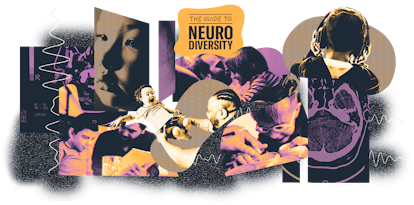
Neurodiversity is the view that brain differences are normal. People withautism, and learning disorders such asADHD,dyslexia, and dyspraxia don’t have deficits; they have a normal variation of the human brain. And no one type of brain is better than another.
The term “neurodiversity,” which was coined in the late 1990s byJudy Singer, anautisticsociologist, frames brain differences as unique strengths that schools, the workplace and the rest of society should value. Rather than seeking to “cure” these differences, neurodiversity gives space and opportunity to people across a range of brain differences, so that they can play to their strengths.
At its core, neurodiversity is the hope that people with atypical ways of perceiving and interacting with the world can know that they’re accepted and normal, and not wrong or lesser-than. And when parents understand theirneurodivergent childrenin a context of acceptance and normalcy, kids have a better chance to grow and thrive.
So Your Kid's Been Diagnosed With Autism. Now What?
How to manage your emotions about the diagnosis, access autism support services, and more.
7 Ways To Motivate A Kid With ADHD To Do Homework And Chores
Start by meeting your kid where they are — and really listen to what they’re telling you.
“Special Needs” Is a Euphemism That Hurts Disabled Kids
Disabled people have called for the end of the term. Research shows the harm it causes.
ADHD And Autism Aren’t The Same, But They Are Closely Related
What to know — and do — if you think your child may be showing signs of one or both conditions.
How To Spot Autism Masking In Kids — And What To Do About It
When autistic kids feel like they have to act differently to fit in, their mental health suffers.
5 Ableist Words A Parent Should Never, Ever Say In Front Of Their Kid
这些短语hurt the disability community.
Autism
What Is Stimming And When Is It A Significant Child Behavior?
An Autism Meltdown Is Nothing Like a Temper Tantrum — Here’s Why
3 Big Mistakes Parents Of Autistic Kids Make — And How To Avoid Them
Stop Being So Protective Of Your Autistic Child, Temple Grandin Says
It’s Time To Stop Calling Autism “Asperger’s”
3 Factors That Decidedly Do Not Cause Autism
ADHD
6 Expert Strategies To Help Parents Understand Their Kid’s ADHD
Inattentive ADHD Is A Quiet Crisis That’s Leaving Girls Behind
7 Things About ADHD In Children That Parents Get Wrong
This Is How ADHD Can Be A Superpower For Kids
如何管教孩子多动症
Why ADHD Might Actually Be Good For Your Kid, According To Experts
Why Parents Of Autistic Kids Should Avoid ABA Therapy
"When you make a child repeat something over and over, that’s abusive."
What To Do When Your Autistic Child Gets Aggressive
There’s no reasoning an autistic child out of an aggressive outburst. But there are other ways to handle it.
How To Navigate The Adderall Shortage If Your Kid Has ADHD
What to do if you can’t find a pharmacy that has your child’s ADHD medication in stock.
Pathological Demand Avoidance May Be Why Your Autistic Kid Won’t Follow Directions
It’s not that they don’t want to. It’s that they can’t.
An Autism Meltdown Is Nothing Like a Temper Tantrum — Here’s Why
You definitely shouldn't react to them the same way.
What Is Stimming And When Is It A Significant Child Behavior?
Every child will engage in repetitive stimulating behaviors known as stimming — only a few will be autistic.
如何管教孩子多动症
Helping kids learn right from wrong is hard enough. Throw ADHD into the mix and you’ve got the makings of a perfect storm.
Inattentive ADHD Is A Quiet Crisis That’s Leaving Girls Behind
A form of ADHD that shows itself in quiet, spacey, withdrawn children and adults usually flies under the radar. This is a problem.
维生素可以帮助儿童多动症,Study Says
56% of kids who took micronutrients had less severe ADHD symptoms.
ADHD And Autism Aren’t The Same, But They Are Closely Related
What to know — and do — if you think your child may be showing signs of one or both conditions.
What To Do When Your Child Is A Late Talker
How parents can spot the early signs of language developmental delays — and when and how to intervene.
3 Factors That Decidedly Do Not Cause Autism
Autism rates are increasing. Experts are scrambling to entirely understand why. What they do know so far is what doesn’t cause autism.
The Difference Between Signs Of Developmental Delay Vs. Autism
Before parents leap to the conclusion that their child is on the spectrum, it’s important to look into these diagnostic mimics.
So Your Kid's Been Diagnosed With Autism. Now What?
How to manage your emotions about the diagnosis, access autism support services, and more.
How To Spot Autism Masking In Kids — And What To Do About It
When autistic kids feel like they have to act differently to fit in, their mental health suffers.
Your Kid’s Brain Development In The First 1,000 Days: A Cheat Sheet
The brain develops faster through the first 1,000 days of life than at any other time. Here's what you need to know.